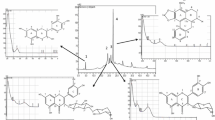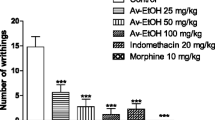Abstract
The analgesic and anti-inflammatory activities of a Southeastern Brazilian brown propolis were evaluated using the formalin test and carrageenan-induced mechanical hypernociception. The hydroalcoholic extract and the volatile fraction were evaluated at doses of 50, 100, and 200 mg/kg. In the formalin test, the crude extract reduced the response by 73, 83, and 89% for the first phase and 48, 65, and 75% for the second phase, respectively. The volatile fraction reduced the response by 75, 94, and 99% and 30, 53, and 91% for the first and second phases. For the carrageenan test, the hydroalcoholic extract and volatile fraction showed mechanical sensitization reductions of 57, 67, and 79% and 62, 79, and 88%, respectively, after 48 h. Indomethacin and morphine showed inhibitions of 42 and 88%, respectively. In the tail-flick assay, the results showed evidence of analgesic activities; the animals treated with crude extract increased the nociceptive threshold by 58 ± 8% and 70 ± 6% and 77 ± 10%, respectively, for evaluated doses, and 55 ± 6% and 73 ± 7% and 82 ± 14% for the volatile fraction, compared with control. The coadministration of naloxone altered the antinociceptive effect of morphine and propolis, suggesting that brown propolis has an action on the central nervous system.
Graphical Abstract





Similar content being viewed by others
References
Arruda C, Ribeiro VP, Almeida MO, Mejía JAA, Casoti R, Bastos JK (2020a) Effect of light, oxygen and temperature on the stability of artepillin C and p-coumaric acid from Brazilian green propolis. J Pharm Biomed 178:112922. https://doi.org/10.1016/j.jpba.2019.112922
Arruda C, Ribeiro VP, Mejía JAA, Almeida MO, Goulart MO, Candido ACBB, Santos RA, Magalhães LG, Martins CHG, Bastos JK (2020b) Green propolis: cytotoxic and leishmanicidal activities of artepillin C, p-coumaric acid, and their degradation products. Rev Bras Farmacogn 30:169–176. https://doi.org/10.1007/s43450-020-00043-3
Bars D, Gozariu M, Cadden SW (2001) Animal models of nociception. Pharmacol Rev 53:597–652
Beserra FP, Gushiken LFS, Hussni MF, Ribeiro VP, Bonamin F, Jackson CJ, Pellizzon CH, Bastos JK (2020) Artepillin C as an outstanding phenolic compound of Brazilian green propolis for disease treatment: a review on pharmacological aspects. Phytother Res:1–13. https://doi.org/10.1002/ptr.6875
Eghianruwa Q, Osoniyi O, Maina N, Wachira S, Imbuga M (2020) Evaluation of analgesic activities of extracts of two marine molluscs: Tympanotonus fuscatus var radula (Linnaeus) and Pachymelania aurita (Müller). J Pain Res 13:2739–2747. https://doi.org/10.2147/JPR.S271458
Fecho K, Manning EL, Maixner W, Schmitt CP (2007) Effects of carrageenan and morphine on acute inflammation and pain in Lewis and Fischer rats. Brain Behav Immun 21:68–78. https://doi.org/10.1016/j.bbi.2006.02.003
Freitas AS, Barth OM, Sales EO, Matsuda AH, Muradian LBA (2011) A palynological analysis of Brazilian propolis samples. JAAS 48:67–74. https://doi.org/10.3896/IBRA.4.03.2.01
Ikeda R, Yanagisawa M, Takahashi N, Kawada T, Kumazawa S, Yamaotsu N, Nakagome I, Hirono S, Tsuda T (2011) Brazilian propolis-derived components inhibit TNF-α-mediated downregulation of adiponectin expression via different mechanisms in 3T3-L1 adipocytes. Biochim Biophys Acta 1810:695–703. https://doi.org/10.1016/j.bbagen.2011.04.007
Kocot J, Kiełczykowska M, Luchowska-kocot D, Kurzepa J, Musik I (2018) Antioxidant potential of propolis, bee pollen, and royal jelly: possible medical application. Oxidative Med Cell Longev 2018:1–29. https://doi.org/10.1155/2018/7074209
Kumazawa S, Hayashi K, Kajiya K, Ishii T, Hamasaka T, Nakayama T (2002) Studies of the constituents of Uruguayan propolis. J Agric Food Chem 50:4777–4782. https://doi.org/10.1021/jf020279y
Li F, Awale S, Tezuka Y, Kadota S (2008) Cytotoxic constituents from Brazilian red propolis and their structure–activity relationship. Bioorg Med Chem 16:5434–5440. https://doi.org/10.1016/j.bmc.2008.04.016
Lima VHM, Almeida KCR, Alves CCF, Rodrigues ML, Crotti AEM, Souza JM, Ribeiro AB, Squarisi IS, Tavares DC, Martins CHG, Miranda MLD (2019) Biological properties of volatile oil from Brazilian brown propolis. Rev Bras Farmacogn 29:807–810. https://doi.org/10.1016/j.bjp.2019.07.004
Lopes AH, Silva RL, Fonseca MD, Gomes FI, Maganin AG, Ribeiro LS, Cunha FQ, Alves-Filho JC, Zamboni DS, Franklin BS, Gombault A, Quesniaux VFJ, Couillin I, Ryffel B, Cunha T (2019) Carrageenan triggers NLRP3 inflammasome activation and IL-1β production by macrophages. SSRN Electron J. https://doi.org/10.2139/ssrn.3405570
Machado JL, Assunção AKM, Silva MCP, Reis AS, Costa GC, Arruda DS, Rocha BA, Vaz MMOLL, Paes AMA, Guerra RNM, Berretta AA, Nascimento FRF (2012) Brazilian green propolis: anti-inflammatory property by an immunomodulatory activity. Evid-Based Compl Alt 2012:1–10. https://doi.org/10.1155/2012/157652
Machado BAS, Silva RPD, Barreto GDA, Costa SS, Silva DFD, Brandão HN, Rocha JLC, Dellagostin OA, Henriques JAP, Umsza-Guez MA, Padilha FF (2016a) Chemical composition and biological activity of extracts obtained by supercritical extraction and ethanolic extraction of brown, green and red propolis derived from different geographic regions in Brazil. PLoS One 11:e0145954. https://doi.org/10.1371/journal.pone.0145954
Machado CS, Mokochinski JB, Lira TO, Oliveira FCE, Cardoso MV, Ferreira RG, Sawaya ACHF, Ferreira AG, Pessoa C, Cuesta-Rubio O, Monteiro MC, Campos MS, Torres YR (2016b) Comparative study of chemical composition and biological activity of yellow, green, brown, and red brazilian propolis. Evid-Based Compl Alt 2016:1–11. https://doi.org/10.1155/2016/6057650
Medzhitov R (2008) Origin and physiological roles of inflammation. Nature 454:428–435
Omote K, Hazama K, Kawamata T, Kawamata M, Nakayaka Y, Toriyabe M, Namiki A (2001) Peripheral nitric oxide in carrageenan-induced inflammation. Brain Res 912:171–175. https://doi.org/10.1016/S0006-8993(01)02733-0
Paulino N, Abreu SRL, Uto Y, Koyama D, Nagasawa H, Hori H, Dirsch VM, Vollmar AM, Scremin A, Bretz WA (2008) Anti-inflammatory effects of a bioavailable compound, artepillin C in Brazilian propolis. Eur J Pharmacol 587:296–301. https://doi.org/10.1016/j.ejphar.2008.02.067
Pinheiro BG, Silva AS, Souza GE, Figueiredo JG, Cunha FQ, Lahlou S, Silva JK, Maia JG, Sousa PJ (2011) Chemical composition, antinociceptive and anti-inflammatory effects in rodents of the essential oil of Peperomia serpens (Sw.) loud. J Ethnopharmacol 138:479–486. https://doi.org/10.1016/j.jep.2011.09.037
Ribeiro PRV, Girão DC, Pimenta ATA, Braz-Filho R, Guedes MLS, Silveira ER, Lima MAS (2013) Clerodane and patchoulene terpenes as new constituents from Baccharis salzmannii DC. Biochem Syst Ecol 50:101–105. https://doi.org/10.1016/j.bse.2013.03.042
Ribeiro VP, Arruda C, El-Salam MA, Bastos JK (2018) Brazilian medicinal plants with corroborated anti-inflammatory activities: a review. Pharm Biol 56:253–268. https://doi.org/10.1080/13880209.2018.1454480
Ribeiro VP, Arruda C, Silva JJM, Meíja JAA, Furtado NAJC, Bastos JK (2019) Use of spinning band distillation equipment for fractionation of volatile compounds of Copaifera oleoresins for developing a validated gas chromatographic method and evaluating antimicrobial activity. Biomed Chromatogr 33:e4412. https://doi.org/10.1002/bmc.4412
Ribeiro VP, Arruda C, Mejía JAA, Candido ACBB, Santos RA, Magalhães LG, Bastos JK (2020) Brazilian southeast brown propolis: gas chromatography method development for its volatile oil analysis, its antimicrobial and leishmanicidal activities evaluation. Phytochem Anal. https://doi.org/10.1002/pca.2988
Santos DA, Fukui MJ, Dhammika NNP, Khan SI, Sousa JP, Bastos JK, Andrade SF, Silva Filho AA, Quintão NL (2010) Anti-inflammatory and antinociceptive effects of Baccharis dracunculifolia DC (Asteraceae) in different experimental models. J Ethnopharmacol 127:543–550. https://doi.org/10.1016/j.jep.2009.09.061
Sartori G, Pesarico AP, Pinton S, Dobrachinski F, Roman SS, Pauletto F, Rodrigues LC, Prigol M (2012) Protective effect of brown Brazilian propolis against acute vaginal lesions caused by herpes simplex virus type 2 in mice: involvement of antioxidant and anti-inflammatory mechanisms. Cell Biochem Funct 30:1–10. https://doi.org/10.1002/cbf.1810
Shibata M, Ohkubo T, Takahashi H, Inoki R (1989) Modified formalin test: characteristic biphasic pain response. Pain 38:347–352. https://doi.org/10.1016/0304-3959(89)90222-4
Silva JJM, Ribeiro VP, Lemos M, Crotti AEM, Rogez H, Bastos JK (2020) Reliable methods for analyses of volatile compounds of Copaifera oleoresins combining headspace and gas chromatography. Chem Biodivers 17:e1900440. https://doi.org/10.1002/cbdv.201900440
Silva PHM, Brito JO, Silva Junior FG (2006) Potential of eleven Eucalyptus species for the production of essential oils. Sci Agr 63:85–89. https://doi.org/10.1590/S0103-90162006000100014
Simone-Finstrom M, Spivak M (2010) Propolis and bee health: the natural history and significance of resin use by honey bees. Apidologie 41:295–311. https://doi.org/10.1051/apido/2010016
Sousa JPB, Bueno PCP, Gregório LE, Silva Filho AA, Furtado NAJC, Sousa ML, Bastos JK (2007) A reliable quantitative method for the analysis of phenolic compounds in Brazilian propolis by reverse phase high performance liquid chromatography. J Sep Sci 30:2656–2665. https://doi.org/10.1002/jssc.200700228
Sousa JPB, Jorge RF, Leite MF, Furtado NAJC, Bastos JK, Silva Filho AA, Queiroga CL, Magalhães PM, Soares AEE (2009) Seasonal variation of the (E)-nerolidol and other volatile compounds within ten different cultivated populations of Baccharis dracunculifolia D.C. (Asteraceae). J Essent Oil Res 21:308–314. https://doi.org/10.1080/10412905.2009.9700179
Yang C, Luo L, Zhang H, Yang X, Lv Y, Song H (2010) Common aroma-active components of propolis from 23 regions of China. J Sci Food Agric 90:1268–1282. https://doi.org/10.1002/jsfa.3969
Zhang P, Bi RY, Gan YH (2018) Glial interleukin-1β upregulates neuronal sodium channel 1.7 in trigeminal ganglion contributing to temporomandibular joint inflammatory hypernociception in rats. J Neuroinflammation 15:117. https://doi.org/10.1186/s12974-018-1154-0
Funding
This work received financial support from the São Paulo Research Foundation (FAPESP) (Process Numbers 2017/08386-6 and 2017/04138-8).
Author information
Authors and Affiliations
Contributions
VPR and JKB were responsible for the study’s design. VPR, GVS, and JAAM performed the anti-inflammatory and antinociceptive experiments. VPR and CA performed phytochemical analysis. JAAM helped with the treatment and discussion of the results. VPR wrote the manuscript, and JKB supervised the study and reviewed the manuscript. All the authors have approved the manuscript.
Corresponding author
Ethics declarations
Conflict of Interest
The authors declare that they have no conflict of interest.
Animal Study
The experiment protocols were approved by the by the Ethics and Research Council on the Use of Animals of the School of Pharmaceutical Sciences of Ribeirão Preto of the University of São Paulo (Process No. 18.1.834.60.1, March 1, 2019). All experiments were carried out under the Ethical Principles of Animal Experimentation recommended by the Brazilian College of Animal Experimentation (COBEA).
Supplementary Information
ESM 1
(PDF 196 kb).
Rights and permissions
About this article
Cite this article
Ribeiro, V.P., Símaro, G.V., Mejia, J.A.A. et al. Anti-inflammatory and Antinociceptive Activities of the Hydroalcoholic Extract and the Volatile Fraction of Southeastern Brazilian Brown Propolis. Rev. Bras. Farmacogn. 31, 59–66 (2021). https://doi.org/10.1007/s43450-020-00122-5
Received:
Accepted:
Published:
Issue Date:
DOI: https://doi.org/10.1007/s43450-020-00122-5




